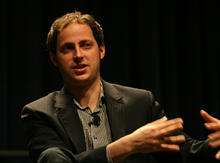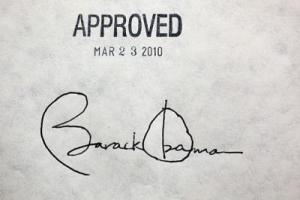On science blogs this week: Whew!
POST-MORTEM ON NATE SILVER. Who is anything but dead; the uber-psephologist is being touted as a god of science because the poll analyses he blogged at the New York Times were so accurate. I described the flap over Silver's findings here last week. They pretty consistently showed a lead for Obama, which inflamed both Romney apologists and pundits on both left and right.
This week, begin the post-mortem with Paul Raeburn at the Knight Science Journalism Tracker who critiques some of the critiques. If you want to know how Silver arrived at his very accurate election calls, visit GrrlScientist, where biostatistician Bob O'Hara is happy to lead you through the statistical thicket.
Jennifer Ouellette, at Cocktail Party Physics, considers math terror and the correct Silver calls. "Boo-yah!," she shouts. "Behold the data, for it is mighty!" She also points out that Silver was not the only psephologist to forecast the election correctly, and that Silver himself got a couple of state races wrong.
In fact Silver's record is by no means perfect, Colby Cosh argues at his Macleans.CA blog. Cosh recaps Silver's career as a baseball statistician, building a model that was often right but had a hard time dealing with outliers like Japanese outfielder Ichiro Suzuki, who played for the Seattle Mariners. He also notes that Silver struck out with a model he built for a 2010 election in the UK. Cosh points out too that other statisticians do as well as Silver with much simpler models.
Although he admires Silver, at Built on Facts Matt Springer also argues that what he does is not necessarily an improvement on simpler models. Springer declares, moreover, that Silver's model is not science — or that it might be, but we don't know because it's proprietary.
But science has to be testable, and while and accurate prediction is a test, it doesn’t advance our understanding of the world unless we know just what it is we’re testing.
In his long, thoughtful post at Uncertain Principles, Chad Orzel observes
I think Silver was really useful for political culture as a whole. While the national poll numbers were always a little troubling, and the media did their best to whip up some drama, Silver’s aggregation provided a valuable corrective, in that for all the frantic horse-race chatter, the numbers barely moved. It’s a reminder that the vast majority of what you see on political blogs and cable chat shows is ultimately pretty unimportant.
And forgettable. Which is probably why those who predicted a big Romney win will continue to stay employed. But I'm going to try hard to keep in mind that paying attention to punditry is pretty pointless. It should save me a lot of time between now and November 2016.
THE FATE OF OBAMACARE. Obamacare topped Laura Newman's list of reasons to vote Dem at her blog Patient POV. She was hardly alone; a lot of us are relieved. It's the most important election ever for health care in this country, says David Cutler at the JAMA Forum.
So far as I know Nate Silver hasn't analyzed polls assessing public opinion about the Affordable Care Act. They have historically been negative, but the one I saw Election Day — can't remember where, it probably came from an exit poll that sailed past me on TV — was closer to evenly split. I'm one of those who has always believed that once the ACA was actually in business, even many of the naysayers would become converts, and eventually Obamacare would be as popular as Medicare. Now we're going to find out.
Three posts at the JAMA Forum consider Obamacare's future. David Cutler (cited above) believes left and right can find common ground for some changes in the law. Aaron Carroll argues that few states will opt out of Medicaid expansion; Obamacare is dangling too many yummy carrots urging expansion, and if a state doesn't expand, sticks will be flung by a furious electorate. Stuart Butler is not so sure. He also views the costs of Obamacare with a jaundiced eye, but thinks prospects for serious reform of Medicare are looking up.
At Capsules, the Kaiser Health News blog, Andrew Villegas summarizes some health policy commentary from both friends and foes. Aaron Carroll, the Incidental Economist, is hopeful that the Congressional conversation will now turn away from repeal to ideas for reform. He lists some offered by David Frum.
Robert Laszewski offers what he calls a daunting Obamacare to-do list at The Health Care Blog. At Wonkblog, Sarah Kliff describes Republican governors scrambling to figure out what to do about setting up state exchanges for buying health insurance. The deadline is just a week away.
I guess they didn't read Nate Silver. Boo-yah! Behold the data, for it is mighty!
Pia Christensen offers a big help to medical writers at the AHCJ blog Covering Health: a Storify of tweets suggesting synonyms for "implementation." In a different post there, Joanne Kenen notes that implementation (enaction, adoption, phase-in, launch, installation) will proceed, but "probably not without bumps and challenges, so you will have plenty to write about." Repeal may be off the table, but there are other legal challenges, which she describes.
At the Health Business Blog, David Williams says
The Affordable Care Act aka ObamaCare is a moderate law filled with Republican-friendly ideas about reliance on the market and personal responsibility ... Rather than fighting against implementation it’s time to make ObamaCare a success.
From his lips to God's ear.
WARMING UP TO CLIMATE CHANGE? Obama actually mentioned global warming in his victory speech, and hope leapt up in the breasts of climate mavens despite the fact that the mention was very very brief. Very. Curtis Brainard surveys some of the journo responses at the Observatory. There was lots of commentary and even information, Brainard says, but little that was fresh.
On climate and energy issues, David Biello expects more of the same from the Obama second act. Meaning more executive orders like the one on fuel standards, more regulatory action against coal-fired plants, continued emphasis on both shale gas and alternative energy, and more drilling (perhaps on public lands). He doesn't see much chance for a carbon tax. Find the post at SciAm's Obervations.
Andy Revkin and others are exploring the notion that superstorm Sandy may, fortuitously, spur action on climate change. That's because Sandy swamped lower Manhattan. The Stock Exchange was closed and Wall Street types were seriously inconvenienced.
Revkin deconstructs a Tina Rosenberg piece arguing that the huge economic losses from extreme weather — everything from crops wiped out to the pummeling of insurance companies — is making it clearer that while mitigation is costly, so is doing nothing. It's a hidden tax. But Revkin is not hopeful that quick action is forthcoming.
Whether or not you or I like it, the path forward will remain largely shaped by a perpetual “slo-mo pushmi-pullyu fight” that is only partly determined by who has more money and influence (although those forces are real). Our divergent value sets, from liberal to libertarian ... guarantee division on where to set the balance.



